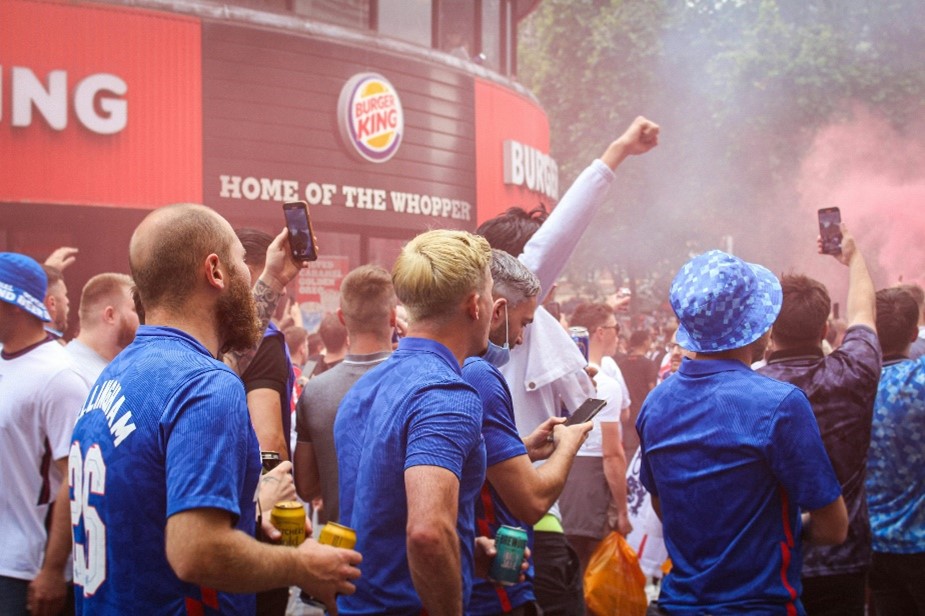LONG READ
In May Alex Halls and Emily Boswell hosted “Beyond Booze: Building Brand Presence for Non-Alcoholic Drinks in the UK Market” alongside a brilliant panel including Elli Leeming, Head of Operations, Hip-Pop, Rob Buchinger-Jones, COO and Co-Founder, Below Brew Co. and Stephanie Elswood, Director and Founder, CAROUSE
With all signs pointing to the UK population reducing its alcohol intake, especially those entering legal age, and more and more brands entering the market (not only traditional “alcohol free” alternatives but also grown-up soft drinks and functional drinks), we wanted to discuss what can brands do to stand out, build loyalty and keep their head above the noise?
You can watch the full video here:
Here’s an overview of the key talking points:
Is Dry January so last year? And is Dry June here to stay?
While it’s not as straight forward as that, there is certainly weight behind June being a much better month for no and low than January.
January is traditionally a lean month and one where consumers try to curb spending habits after Christmas. It’s also very poor for on trade as people stay at home and socialise less. Whilst Dry January helps give a boost to sales for non-alcoholic brands, January overall is still a much more difficult month than the summer months.
Summer offers a huge opportunity for non-alcoholic brands, there’s the summer of sport with EURO 2024 kicking it off in June, as well as Wimbledon and Paris Olympics. To capitalise on the summer drinking occasions it’s all about inserting yourself into the narrative as Elli describes:
“I think the real key to taking advantage of the summer sport is to ensure that you are in the right place at the right time. So that’s making sure that if you’re in supermarkets, having the right promos. if you’re on trade, it’s being in the right locations for people to be able to grab those low alcohol beverages that have them alongside kind of the traditional beer or alcohol options. It’s also about having the right products. One of the products that we just in the development stage of is strawberries and cream, which is so exciting because it goes hand in hand with Wimbledon.”
It’s not all about Gen Z you know…
Whilst Gen-Z are clearly a generation that has more teetotallers than those who have gone before them, there’s been a shift across all generations and it’s actually been driven more by circumstances than by a particular group. People reassessing their drinking habits post-Covid, the cost of living crisis and a number of other factors have all played a role.
It’s also been driven by people who are looking for options to go alongside alcoholic options, rather than cutting it out completely, cutting down on their alcohol intake.
Moderation is key it seems…
The general consensus from the panel was that their core audience is definitely heavily weighted to people who are looking to moderate their intake rather than cut it out completely.
Interestingly all three brands have taken this on board in their marketing efforts and are looking at how they can implement messaging and strategies that promote the benefits of moderation, the social situations that can be enhanced by supplementing their alcohol intake with a no and low option, not to mention the joy of not having a hangover the next day.
It’s clear that it’s also important not to be too preachy about going teetotal or cutting out alcohol completely and instead focusing on focused on the flavour profiles, the health benefits and usage inspiration.
Bouncing back from Covid consumption
Rob spoke about how balance and moderation has become the main driving force post Covid, and while Gen-Z may have been quicker to realise that, it’s still being seen across all generations: “We’ve seen a shift through all generations. I certainly think Covid actually helped with that, because I think a lot of people went off and caned it because they had nothing else to do. Then they realised that this isn’t a good thing, and there should be more balance. I think the balance really is key. People are learning that, it’s better to have moderation and to have a little alcohol free and then an alcoholic beer. It’s just taking a little while longer for those older generations to break those habits. But we’re getting there.”
Steph also raised a point about how the lack of human interaction curing Covid has led to behavioural shifts today, she spoke about how people are craving human connection post covid and they want to remember their experiences more and more, which has led her to start her Dry Disco events which have been hugely popular.
Everyone’s in agreement, marketing, social media and PR is an absolute MUST for challenger brands!
Taking risks as a challenger brand is vital in getting your head above the noise and taking on the big brands.
Elli raised a really interesting point about having to take risks with marketing as challenger brands do not have the budgets to compete with the much larger brands in the market. A perception of looking like a bigger company than they are to grow brand awareness and brand trust, working with influencers on the rise rather than the huge ones. She spoke about how those early years are really important in investing in marketing in terms of growing and building that brand awareness so that, you get listings.
This is an excellent point and something we have seen time and time again at Hatch. So many people have a fantastic product, but don’t spend the money, or put in the effort in marketing it effectively. There’s really only so far you can go with a great product if no one hears about you or sees the brand.
An effective integrated marketing strategy is crucial for challenger brands to get off the ground and survive those early years.
Make sure you paint a picture to educate and inspire your audience…
Steph spoke about how story telling is hugely important for challenger brands especially when the well-established brands take up 85% of market share and can just release a 0% product into its extensive range. She says: “It is really hard for other smaller brands to make noise. and I think it it’s the beauty of social media is that the way that you can story tell, and I think people want to know more about the behind the scenes of a brand.
“I think that there is this wave of education, of people being more mindful of what they’re putting into their bodies and understanding why maybe our brand maybe better for your health than other brands. But there’s I think the alcohol-free space needs a lot of noise made around the education, because there’s still a huge wave of people that are like, well, why don’t I just have a mocktail or a lemonade? Why do I need an alcohol-free beer or spirit? Whereas there is so much space for us to talk about the reasons why we are helpful and the reasons why alcohol free is so popular at the moment and to do that through different mediums of social media is incredible, but you just need to make sure you get your tone of voice right.
Like the way that we show up on Instagram is so different to how we speak to TikTok, for example and being able to utilise clever ways of marketing because especially when you launch as a smaller brand, you don’t always have the budgets to just put money behind paid spend or to pay influencers.
You have to be really clever with the content that you’re putting out, making sure that it’s speaking directly to your consumer. You could be the best tasting drink on the market, If you don’t know how to get someone to try you, then there’s no point in putting so much time and effort into the flavour, because you need to make sure that you’re getting liquid on lips and people are returning.”
So, there you have it, some fantastic insight from the panel.
If you’re interested in learning more about how PR and social media can play a huge role in getting your brand in front of the right people, please drop me a line at alexhalls@hatch.group and I’ll be happy to grab a delicious no and low drink and chat it through.





